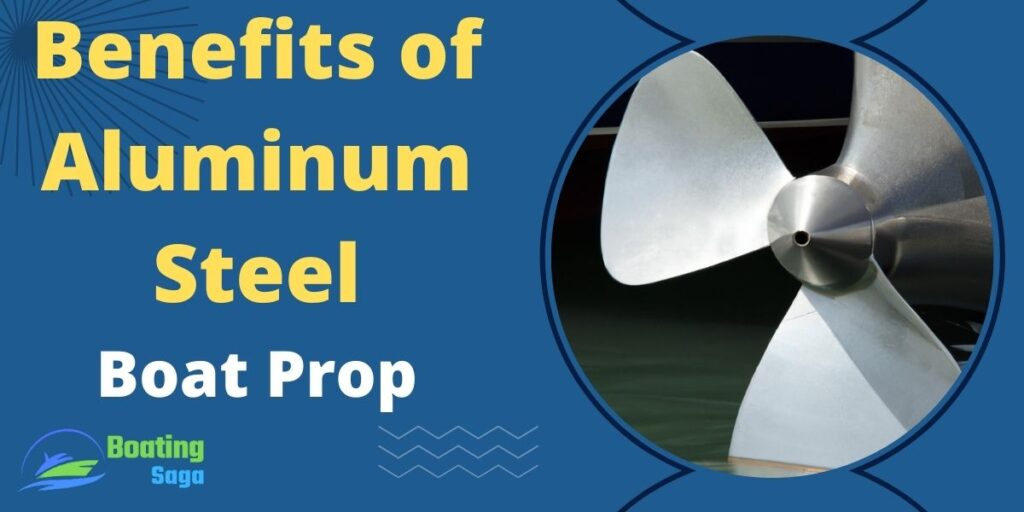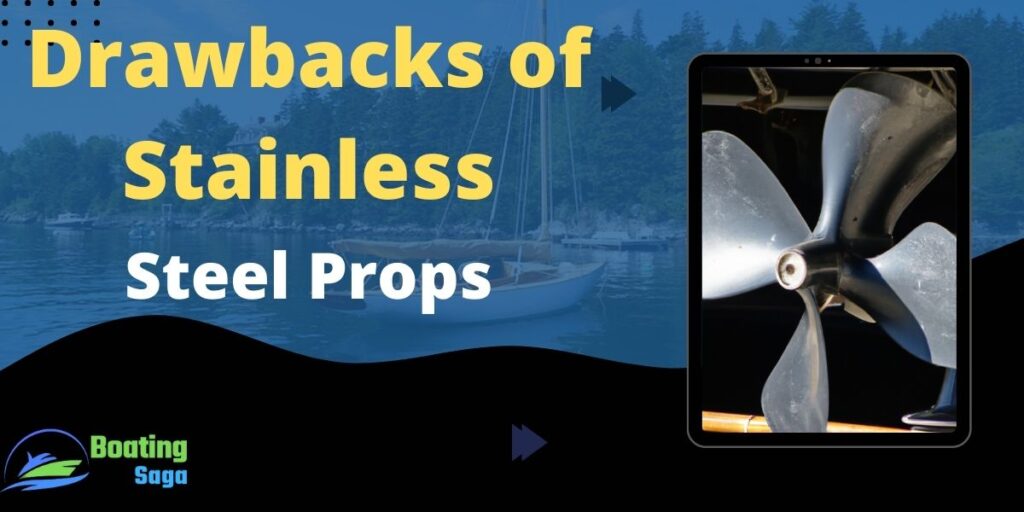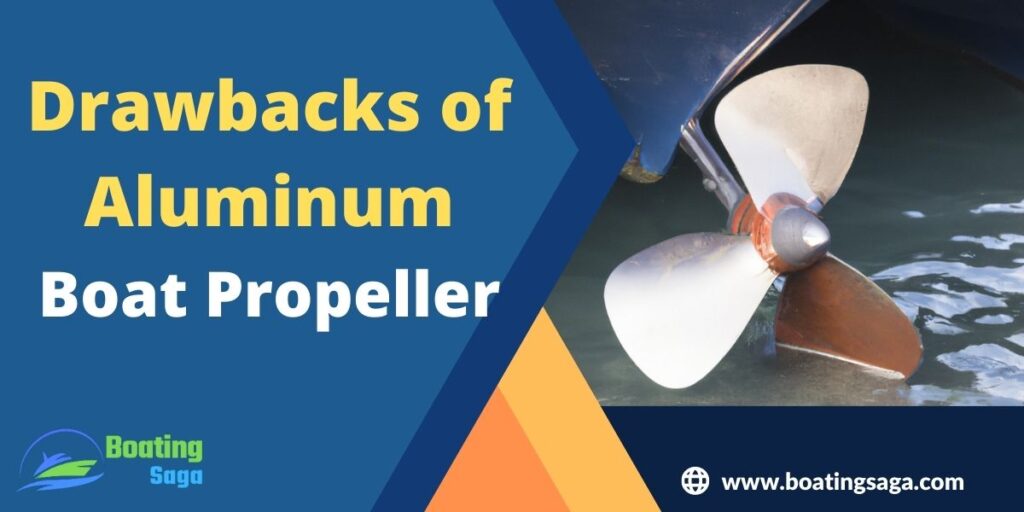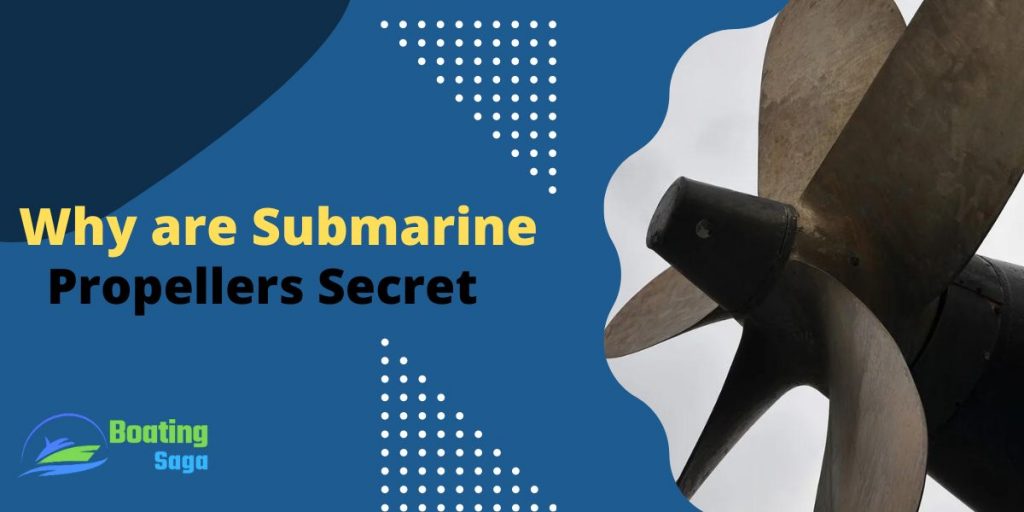
When it comes to selecting a prop for your boat, the decision between different materials especially stainless steel and aluminum prop can be a tricky one. Boaters must consider many factors such as cost, maintenance, and performance. The debate between these two materials has been going on for decades, with boaters weighing in from all over the world.
Whether you have single or dual prop boat, each material has its own unique advantages and disadvantages, so it is important to do careful research before making a purchase.
In this article, we’ll explore the advantages and disadvantages of each material so you can make an informed decision as to which type of prop is best for your boat.
Here is a comparison table between stainless steel and aluminum boat prop for a sneak pick:
| Durability | Very High | Comparatively Low/ Moderate |
| Corrosion Resistance | High | Moderate |
| Strength | High Strong | Less Strong |
| Cost In General | Very Expensive | Less Expensive (30-50% less expensive than stainless steel) |
| Maintenance Issue | Low to Moderate | Moderate to high |
| Appearance | Shiny (retains it for a long period of time) | Matte Finish ( Usually not as shiny as stainless steel) |
| Weldability | Comparatively Difficult to Weld | Comparatively Easy to Weld |
| Parts Availability | Very Easily Available | Easily Available (but not as much as stainless steel) |
| Weight | Heavy | Light |
| Impact Resistance | Very High | Moderate |
| Boat Size | Small to Big Boat | Small to Medium Boat |
| Good for (in general) | Salt Water | Fresh Water |
Table of Contents
1. Benefits of Stainless Steel Boat Propeller

Stainless steel boat propellers are one of the most versatile and reliable options when it comes to powering your vessel. Not only are they designed for long-lasting durability, but they also offer a host of other advantages. In this article, we’ll explore some of the key benefits of stainless steel boat propellers.
Very High Durability
Stainless steel boat propellers provide a number of benefits for boaters. Very high durability is among the probably the best advantages that this type of propeller offers. It can withstand long-term use in saltwater, making it an ideal choice for those who spend a lot of time on the water or live near ocean or coastal areas.
In addition, stainless steel’s strength makes it more reliable as well as more sturdy than other types of metal when it comes to powering boats through rough waters and thus accident can be avoided. This means boaters have greater peace of mind that their vessel will stay safe even when faced with extreme conditions on the open seas.
High Corrosion Resistance
When it comes to corrosion resistance, stainless steel stands out among all other materials used for boat propellers. Not only does this metal possess excellent mechanical properties such as strength and toughness, but also provides superior protection against rust or oxidation caused by saltwater exposure.
Additionally, stainless steel is also resistant to abrasion and shock damage which makes it suitable for use in high-performance boats that encounter rough water conditions.
Longer Life Span
The use of stainless steel boat propellers has numerous benefits that should not be overlooked. Not only do they provide superior performance over aluminum or bronze-based alloyed propeller blades, but they also offer a longer lifespan due to their high tensile strength and temperature resistance. This makes them much better suited for long trips and harsh conditions like saltwater environments.
Minimal Maintenance
It is very easy to clean and requires nothing more than a simple rinse with fresh water after each use.
Additionally, these types of props do not need any specialized paints as well as coatings that would require frequent reapplication or replacement – making them much easier to maintain than other options on the market.
Shiny Appearance
Not only is stainless steel a reliable and durable metal, but it also boasts an array of advantages that make it stand out among other materials. Its bright sheen makes stainless steel boat propellers look great and adds aesthetic value to any vessel.
One of the main benefits of using a stainless steel boat propeller is its very shiny appearance that comes from its attractive chromium finish. This high-end finish gives a brilliant luster that can’t be replicated with cheaper alternatives like aluminum or brass. It also provides an extra layer of protection against corrosion in saltwater environments, making them an ideal choice for boaters who frequently sail in open waters.
2. Benefits of Aluminum Steel Boat Prop

Aluminum steel boats are becoming increasingly popular among boaters, due to the many benefits they provide. Some of the benefits is given below:
Very Much Cost Effective
The biggest benefit of using an aluminum steel boat prop is its cost effectiveness – it provides outstanding performance at an affordable price. It’s lighter than stainless steel props, so you get improved acceleration and top-end speed without sacrificing any strength or reliability.
Very Easy Manufacturing
Manufacturers of aluminum steel boat props have an advantage over other materials because of the ease with which they can be fabricated. With the right equipment, aluminum steel boat props can be easily manufactured in any shape or size desired by the manufacturer.
The process by which aluminum steel boat props are made is relatively simple compared to that of other materials like stainless steel or titanium.
Aluminum steel sheets are cut into small segments then bent into shapes suitable for use as a prop blade. The metal is then carefully welded together so that each blade form fits perfectly with its corresponding part before being shaped and polished for aesthetics and strength.
Better Fuel Efficiency
When used in combination with the correct size and pitch of the blades, an Aluminum steel boat prop can provide more efficient performance from your engine by reducing resistance when cutting through the water. The reduced resistance allows for maximum momentum and thus more use of energy from your engine which results in improved fuel efficiency.
Aluminum steel propellers are also designed for today’s higher horsepower engines which help them better reach their peak performance and deliver reliable results over time with less maintenance required than other types of materials such as brass or stainless steel.
Comparatively Very Lightweight
Aluminum boat props are becoming increasingly popular among boaters due to their comparatively lightweight design. Made from a sturdy aluminum alloy, these boat props are designed to provide exceptional performance while still maintaining a low weight. This makes them ideal for smaller boats, as they don’t add extra weight and drag to the hull of the vessel.
Availability is a Plus Point
Whether you’re looking for a replacement prop or an upgrade from your current setup, there is sure to be an aluminum boat propeller perfect for your vessel. And thanks to the great availability options both online and through local dealerships, finding just what you need has never been easier.
Furthermore, online outlets often feature a wide range of sizes and styles for shoppers to choose from which can help boaters find the perfect fit for their specific needs.
3. Drawbacks of Stainless Steel Props

Price is Comparatively Very High
The price of stainless steel can be very high, especially if you need large quantities of it. The material itself is expensive due to its composition—it must be made from special alloys that contain chromium and nickel in higher amounts than other metals do. As a result, these props can be several times more expensive than their counterparts made with aluminum or brass/bronze.
Weight is a Negative Aspect
One of the major drawbacks of stainless steel props is their weight; despite being strong and corrosion-resistant, they are also much heavier than other materials like aluminum or plastic. This can make them difficult to transport and handle, as well as hard to install in certain environments.
The additional weight of stainless steel props can also lead to higher shipping costs for businesses, as freight companies often charge extra for heavier items. Furthermore, it may add strain on the machines used to operate the prop, which could result in increased repair costs.
Manufacture Difficulties
One of the main challenges of stainless steel is the difficulties involved with its manufacture.
- The production process of making stainless steel requires a high level of precision and accuracy, which can result in costly mistakes if it is not done correctly.
- In addition, the raw materials used needs to be carefully monitored to ensure optimal quality for each batch. This often means extra costs associated with testing and inspection during the manufacturing process.
- Another difficulty lies in obtaining consistent results across batches as different grades of stainless steel react differently when exposed to heat or other forms of force.
4. Drawbacks of Aluminum Boat Propeller

Vulnerable Issues to Corrosion
Saltwater is extremely corrosive when it comes into contact with metal. The ions contained within saltwater can cause oxidation of the metal surface which can lead to pitting and flaking of the metal surface over time.
Propeller blades made from aluminum are particularly susceptible as they are exposed directly to high levels of salinity in the water during operation making them especially prone to corrosion damage.
Strength is Inferior
For starters, aluminum boat propellers cannot handle the same level of stress and strain that stainless steel models can. This means they are more susceptible to damage due to impacts or wear-and-tear, resulting in costly repairs or even complete replacement of the prop. The corrosion resistance of aluminum is also inferior compared to stainless steel and may require more frequent servicing if used in saltwater environments.
On top of that, aluminum props tend to be more easily bent or warped due to their softness when compared with stainless steel props.
Appearance is Not Very Good
Aluminum boat propellers generally do not look as good as stainless steel or bronze props. The finish on aluminum can easily become scratched and discolored over time with exposure to the elements, making them appear dull and unappealing in comparison to other materials.
The appearance of aluminum boat propellers can also be affected by corrosion. This happens when the surface of the prop comes into contact with saltwater or other corrosive substances found in bodies of water. Corrosion will cause pitting and tarnishing which cannot be removed without professional restoration work, leaving an unattractive finish no matter how much care you take to clean it regularly.
Limited Horsepower Capacity
Aluminum boat propellers are usually designed for engines with up to 90-120 total horsepower, so it’s important to take engine size into account when shopping for a new prop. If an engine produces more than 100 HP then a stainless steel or composite prop will be necessary in order to provide the necessary thrust and speed needed while on the water. Without a proper fitting prop, engines may become overloaded resulting in decreased performance and potential damage to the equipment.
Additionally, aluminum props require frequent maintenance as they can quickly become clogged with weeds or other debris in shallow waters.
Unavailability of Replacement Parts
One downside to using aluminum boat propellers is the unavailability of replacement parts. Without access to parts, repairing and maintaining a boat’s propulsion system can become costly and challenging.
The main reason why replacement parts for aluminum boat propellers may not be available is due to their limited lifespan. Aluminum is susceptible to corrosion in saltwater environments, so these types of propellers typically require more frequent maintenance than their stainless steel counterparts.
As the material breaks down over time, it can become difficult or impossible to find replacements for worn-out components. Additionally, some parts may be discontinued by manufacturers after a certain amount of time has passed since production first began.
Saltwater and Freshwater Environment Comparison
When it comes to boat propellers, understanding the difference between stainless steel and aluminum can help you pick the best option for your vessel’s engine. Stainless steel is a great choice for saltwater applications due to its corrosion-resistant nature and durability, while aluminum is an ideal choice for freshwater use because of its light weight and inexpensive cost. Both materials come with their own advantages and disadvantages when used in either fresh or marine waters.
Stainless steel propellers provide superior protection against corrosion in salty environments. As a result, they’re often preferred over aluminum props in saltwater applications because they are less likely to corrode or erode over time. Additionally, stainless steel provides higher tensile strength which allows them to last longer than their lightweight aluminum counterparts.
Aluminum Versus Stainless Steel Propeller: Which One You Should Choose?
Both materials have their pros and cons, which means that depending on the purpose of your boat and intended use, one may be more suitable than the other.
- Aluminum is an economical metal that is lightweight and rust-resistant. It allows a boat to run faster while being easy to repair if damage occurs. The downside of aluminum is that it’s not as durable as stainless steel; so in situations where you will be using your boat more aggressively or in harsher conditions, stainless steel may be a better choice.
- Stainless steel provides superior protection against corrosion and wear but is heavier than aluminum. This makes it better for powering larger boats or ones used in frequent rough waters like ocean waves or white water rapids.
Frequently Asked Questions:

Aluminum Vs Stainless Steel Boat Propellers: Which One is Good for High Speed Boats?
For those looking for a faster journey while on the water, stainless steel is the way to go. Not only does it provide superior strength compared to aluminum, but it also offers greater thrust for more powerful acceleration. This makes it ideal for larger vessels that require more power as well as smaller boats that want maximum speed with minimum effort from its engine. Stainless steel also performs better in heavily loaded conditions such as large wakes or choppy waters.
Stainless Steel Vs Aluminum Boat Propeller: What’s the Average Lifespans of Both?
Stainless steel boat propellers are known for their strength and durability. They are resistant to corrosion and can last up to 10 years with proper care and maintenance.
On the other hand, aluminum props tend to be lighter in weight and more affordable than stainless steel options. However, aluminum does not have as long of a lifespan, typically lasting around five years before needing replacement.
Is a Stainless Steel Prop Provide Less Noise and Vibration Than Aluminum?
If you’re looking for a prop with less noise and vibration, stainless steel may be the way to go. Stainless steel props are constructed from high-grade alloy materials that absorb sound waves more efficiently than aluminum. Not only does this result in lower noise levels, but it also helps reduce vibration felt on deck and through the control mechanism of the motor.
In Case of Oxidation Between Stainless Steel Vs Aluminum Propeller, Which One is Good?
Stainless steel does not corrode easily when exposed to saltwater or other corrosive substances, however it can still oxidize over time if not properly cared for. Aluminum on the other hand, is much less resistant to oxidation than stainless steel but it also weighs significantly less.
Conclusion
When it comes to choosing between a stainless steel prop and an aluminum one, individuals should consider the performance goals they are looking for.
As stainless steel props are better suited for high-performance boats, aluminum props are better suited for slower and smaller vessels.
The cost of both types of props is also something to consider when making a decision. Although stainless steel props can be pricier than aluminum props, their strength and durability make them worth the price in certain situations.


